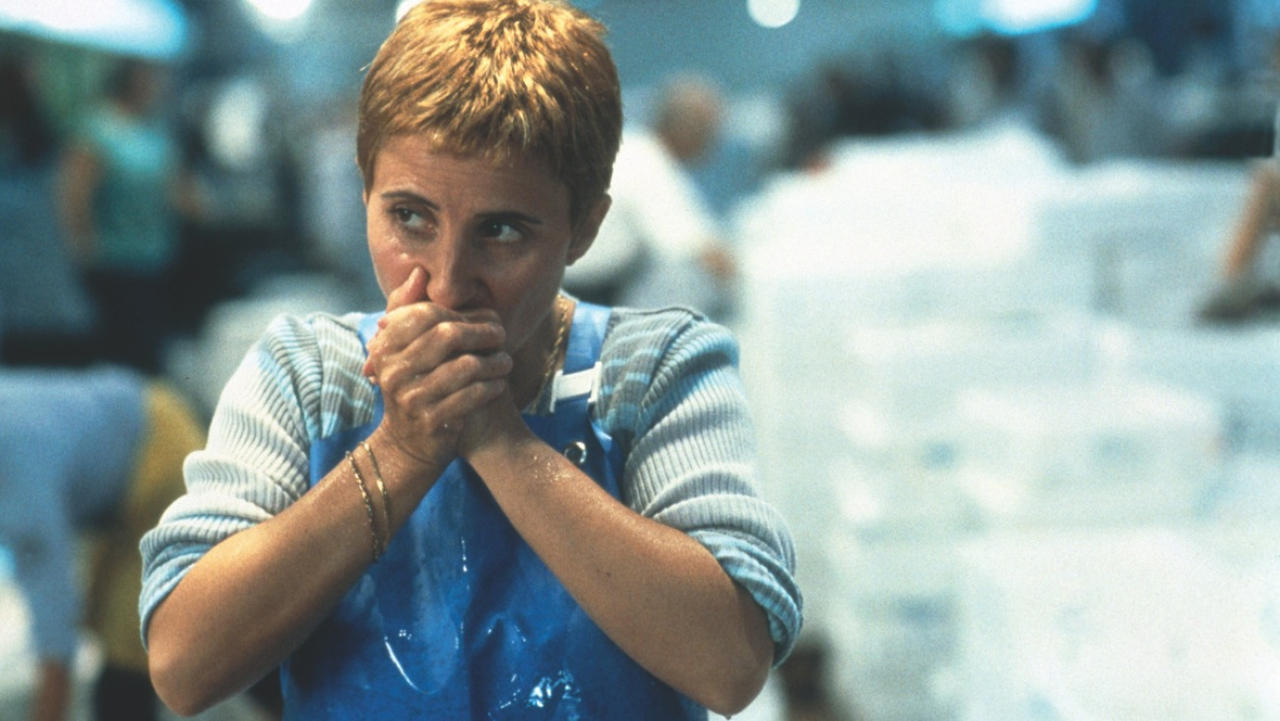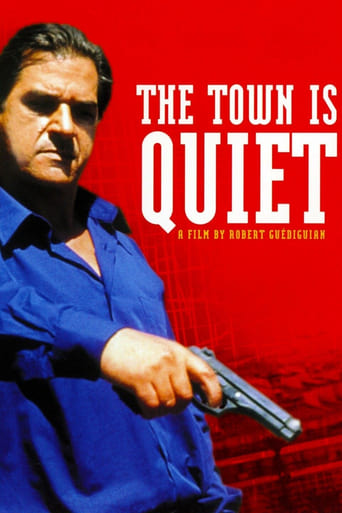

La ville est tranquille or The Town Is Quiet was the first film I saw by Robert Guediguian, who is one of the most acclaimed French filmmakers of today, and it instantly proved his mastery to me. Simply there are two kinds of filmmakers; those who make films, thinking their audience; Alfred Hitchcock, Jean Renoir, and those who make films relying on personal intuition; Robert Bresson, Jean-Luc Godard, Jacques Tati. Robert Guediguian is clearly in the district of the former group and he has said that he wants to create popular cinema, which is understandable for people like his father, but from which several layers and depths can be found. There is no reason to think which way of making films is better. What's really hard is finding the golden mean. Alfred Hitchcock found it, Alain Resnais has found it and so has Robert Guediguian. La ville est tranquille is clearly a high quality for its content and style, entertainment and message.La ville est tranquille begins with a captive camera tracking of Marseille's dock milieu. Eventually the camera ends up filming a young bloke playing the score with an electronic piano. Suddenly we're transferred to a filthy fish market where we see a woman working. Soon we find out that the woman is the mother of a drug addicted young girl who has a daughter of her own. When the film has lasted for about 20 minutes it has already dealt with current themes such as drug addiction, teenage pregnancy, immigration, prostitution and social hierarchy.The film bears a resemblance, for its structure, with such city and family sagas as Edward Yang's A One and A Two (2000), Paul Thomas Anderson's Magnolia (1999) and Alain Resnais' Coeurs (2006). But La ville est tranquille is much more raw, cruel and humanely touching than any of these. It's a grand person mosaic which is about to burst out of its seams. The film has got a wide, variable and rich personal gallery, without making the viewer confused of what is going on; the complexity of several stories that come across is handled brilliantly. It seems to have an indeterministic look at the freedom of man; we're free to make our choices but the choices we make are inevitable. Certain threads still tie our fates together. La ville est tranquille is a story about these threads.Even that La ville est tranquille deals with the upper-class, its worries and problems, Guediguian's sympathy is clearly for the less-fortunate people, their suffering and the strife of the working class. The film's character gallery is incredibly wide and versatile, from social heaven to social hell, from society's elite to North-African immigrants. A city architect Yves who is a true ladies' man represents the higher class with his wife, Viviane who teaches music for the mentally handicapped. In a charming scene Viviane comes across with a North-African man whom she first met while teaching music at a prison.The heart of the person gallery is Michele, the mother of the junkie, who grows out to be the embodiment of the spirit of the working class. She is ready to do anything for her addicted daughter: She asks her ex-boyfriend, a bartender, Gerard to use his connections to the underworld to get small doses of heroin, for her daughter, because of strong withdrawal symptoms. To get all the money for the drugs, Michele has to enter the world of prostitution, and she gets one standard customer; a kind-hearted cab driver who is in a serious debt swirl.In La ville est tranquille documentary-like narrative is combined with cinematographic styling, subtle populism and social message. The distressing scenes of Michele taking care of her addicted daughter force the viewer to enter the reality of the film. We only hear what the characters see, we're trapped in their desolate realities. But Guediguian has placed two scenes, in the beginning and in the end, that differ from this. The first scene where we see a young boy playing an electronic piano. He's a foreigner too, from Georgia, trying to earn the money for an upright piano, and the last scene where he gets the piano. These are the only scenes in which we hear the score. Usually in cinema the music separates film from reality and the viewer is allowed to observe the situations as an outsider. But when there's no music we're forced to be part of the illusionary world. The last scene grows out to be a metaphor of happy future which the immigrants can get as well, and the boy's not the only metaphorical character in this film characterized by allegorical structure. The overexposure - to an ethereal state - indicates that there is still hope, but overall the film has quite a dark and ironic world view of liberty, equality and fraternity.La ville est tranquille is a mosaic full of life. At times it comes close to melodrama as it imitates life but it's strictly in the district of urban realism. The hectic editing creates an incredibly intense and captive atmosphere from which the viewer is only set free in the beginning and in the end. It portrays people living in social heavens and hells but the life is pretty much the same, in both the gutters and in the skyscrapers. In heaven the characters are ostensibly happy but it's only artificial, in hell the characters have to come to terms with their desolation. The film depicts social reality but also personal existentialist agony. All the characters lie, each first impression bluffs - the entire society acts. Nothing is what it seems to be, and the town remains quiet. It doesn't answer to the desperate cries of the characters, no matter are they living in heaven or hell.
... View MoreI guess Robert Guidiguian loves his wife Ariane Ascaride because he photographs her so lovingly but he sure likes to make her suffer. In the only film I can recall off the top of my head in which she had both a husband, child and stable family relationship (the superb Marie-Jo and her 2 loves) she was unable to settle for this and had to take a lover. Normally, as here, she is unhappy in her relationship - assuming she has one and is not a single mother. Here she is really up against it; married to a waste of space who hasn't worked since Ludivine Sagnier made a movie with her clothes on, working herself all night at the fish market, caring for her teenage single mother and junkey with it daughter and getting insults for her pains, and finally turning tricks herself to pay for the monkey on her daughter's back. Against all the odds this is actually a Joy to watch because Ascaride is so luminescent and just one smile can light up Marseilles. As usual the director is flogging his pet hobby-horse and by now he really COULD train a pig to encapsulate it via the refrain Nobody Knows The Truffles I've Seen. For all that he does manage a light touch and most of the vignettes come off thanks to his repertory company of first-rate actors. As long as this cat keeps on churnin em out I'll keep getting it up at the box-office and you can't say fairer than that. 8/10
... View More"The Town is Quiet" is a plaintive and somber look at the lives of several ordinary people who by choice or by chance find extraordinary solutions to their ordinary problems. Set in Marseilles, this typically fatalistic French flick weaves an austere story around loosely interconnected characters including a taxi driver, a fish packer, a bar owner, a drug addicted mother, etc. as it takes on issues from drugs to politics to assassination...etc. sans the tinsel and sensationalism of the usual Hollywood fare. Not likely to have broad appeal, this 2+ hour long subtitled film will be most appreciated by realists with a taste for French cinema. (B)
... View More'La Ville est tranquille', possibly a pun with 'Life is beautiful' ('La Vie est belle' in French), is a movie that confirms former ideas of director Robert Guediguian but in a new, dark style. Those who remember the pretty love story of low class people 'Marius in Jeannette' will be astonished by the maturity of this movie. The same elements, more or less, are here : location (Marseilles), sun, possible or impossible love affairs, racism, violence, addiction to drug and prostitution. But the director does not underline a love affair, he simply focuses on the ordinary tragedies of ordinary people. How we can go through a tragedy just withouth feeling it is possible to do things another way, to have another life - this movie is just about that. It is impossible to escape from one's life and from one's recordings, this can be the moral of this dark tale. As the director puts also several doses of black, desperate humor in several scenes, the audience can breathe and laugh and forget a certain clumsiness in some dialogues. The memorable last sequence is very surprising, and its strong lyricism makes the movie just unforgettable.
... View More